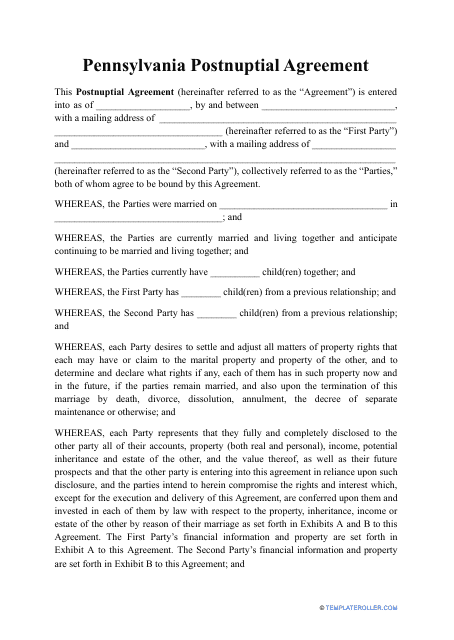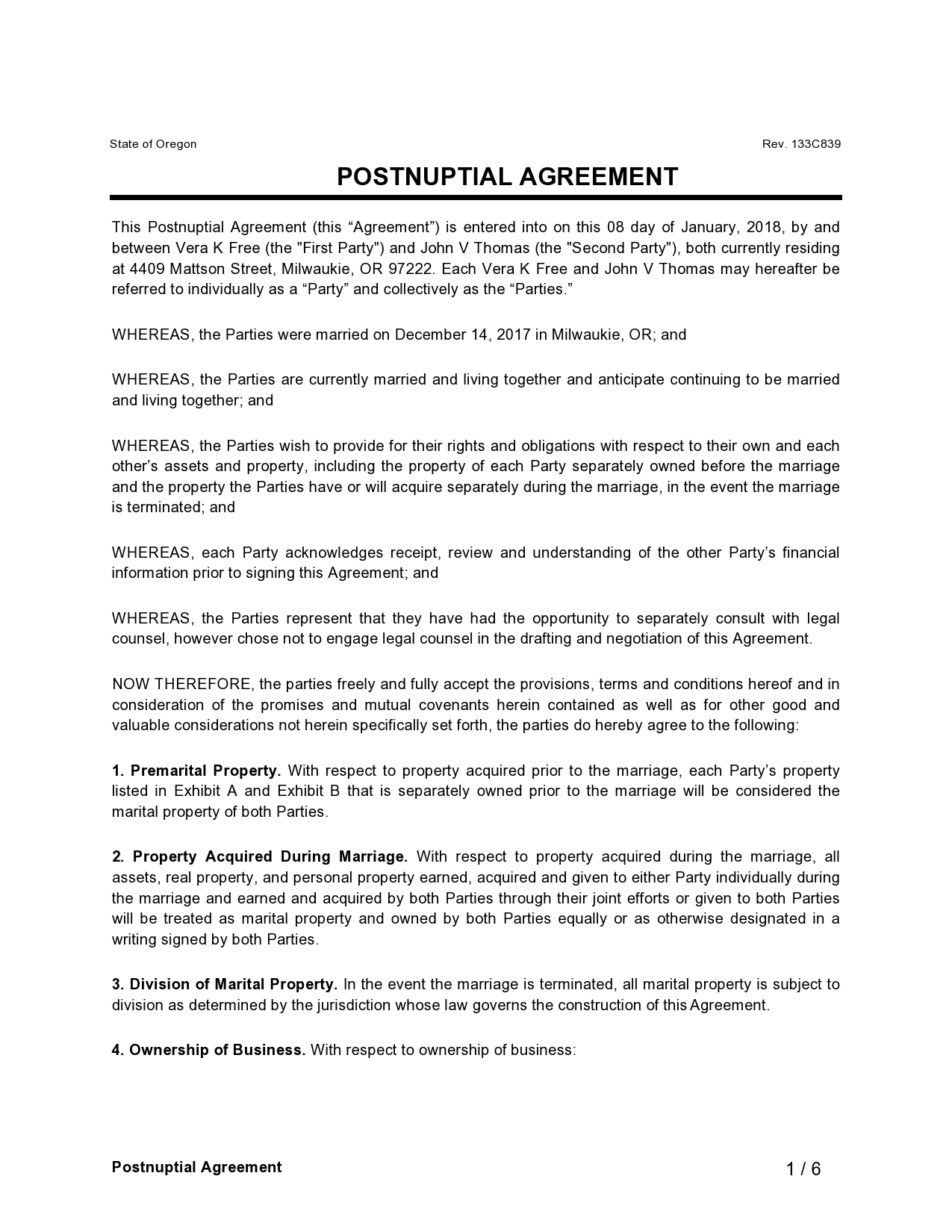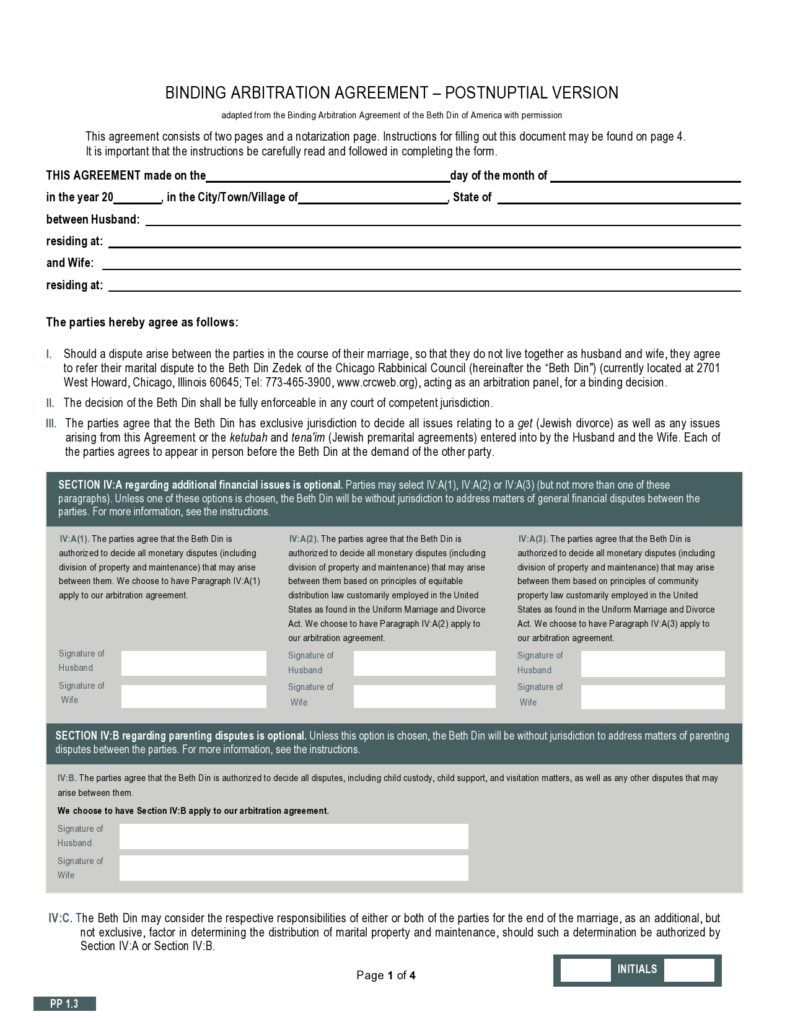The Post-Nuptial Agreement Template for Pennsylvania You Need: Securing Your Future Together
Marriage is a journey, and like any journey, it’s wise to prepare for potential detours. While the initial excitement of tying the knot often overshadows practical considerations, a Post-Nuptial Agreement (Postnup) can be a crucial tool for safeguarding your individual assets and defining financial responsibilities within your Pennsylvania marriage. This article provides a comprehensive guide, including the information you need to understand and utilize a Postnup template effectively.
Understanding the Purpose of a Post-Nuptial Agreement
A Post-Nuptial Agreement is a legally binding contract created after a couple is already married. It functions similarly to a prenuptial agreement (Prenup), but with one key difference: it’s drafted and signed during the marriage, rather than before. It allows married couples in Pennsylvania to:
- Clarify Ownership: Define separate and marital property, ensuring clarity on what each spouse owns individually and what is jointly owned.
- Manage Financial Responsibilities: Outline how debts will be handled, including those existing prior to the agreement and those incurred during the marriage.
- Plan for Potential Divorce: Establish the distribution of assets and liabilities in the event of a divorce, potentially streamlining the process and reducing conflict.
- Protect Business Interests: Safeguard business assets and ownership interests, ensuring continuity and mitigating potential financial impacts of a divorce.
- Address Spousal Support (Alimony): Establish terms for spousal support, including the amount, duration, and conditions.
Key Elements to Include in Your Pennsylvania Post-Nuptial Agreement
While a Postnup can be tailored to your specific needs, certain elements are generally considered essential for enforceability in Pennsylvania. A well-drafted template should address the following:
- Identification of Parties: Clearly state the full legal names of both spouses.
- Recitals: A section that explains the purpose of the agreement and acknowledges the marriage.
- Separate Property: Define and list each spouse’s separate property, including assets acquired before the marriage or received as gifts or inheritances during the marriage. Be specific, including:
- Real estate (addresses, descriptions)
- Financial accounts (bank, investment, retirement)
- Vehicles (year, make, model, VIN)
- Businesses (ownership percentage, valuation)
- Marital Property: Define property acquired during the marriage and how it will be divided in the event of divorce. This often includes:
- Income earned during the marriage
- Assets purchased with marital funds
- Debt Allocation: Specify how debts incurred before and during the marriage will be handled.
- Spousal Support (Alimony): Outline the terms of spousal support, if applicable. This should include:
- The amount of support
- The duration of support
- Conditions that may trigger a modification or termination of support
- Waiver of Rights: Include provisions for waiving certain rights, such as the right to claim property in a divorce proceeding.
- Legal Counsel: Acknowledge that each party has had the opportunity to consult with independent legal counsel. Highly recommended for enforceability.
- Full Disclosure: Ensure full and fair disclosure of all assets, liabilities, and financial information.
- Execution and Notarization: Both parties must sign the agreement in the presence of a notary public.
- Governing Law: State that the agreement is governed by the laws of Pennsylvania.
Finding a Post-Nuptial Agreement Template in Pennsylvania
While numerous online templates are available, choosing the right one is crucial. Consider the following when selecting and using a template:
- Source Credibility: Look for templates from reputable legal websites, law firms, or legal document services.
- Pennsylvania-Specific: Ensure the template is specifically designed to comply with Pennsylvania law. Generic templates may not be enforceable.
- Completeness: The template should cover all essential elements mentioned above.
- Customization: A good template allows for customization to reflect your specific circumstances.
- Review by an Attorney: Highly recommended. Even with a well-drafted template, consulting with a Pennsylvania attorney is essential to ensure the agreement meets your individual needs and is legally sound. An attorney can identify potential pitfalls and advise on the enforceability of specific clauses.
The Importance of Independent Legal Counsel
Perhaps the single most critical factor in ensuring the enforceability of your Pennsylvania Postnup is that both parties have independent legal counsel. This demonstrates that each spouse entered the agreement knowingly and voluntarily. Failure to do so can significantly increase the likelihood of the agreement being challenged in court.
Potential Pitfalls to Avoid
- Lack of Full Disclosure: Failure to fully disclose all assets and liabilities can render the agreement unenforceable.
- Unfair Terms: Agreements deemed unconscionable (grossly unfair) by a court may be invalidated.
- Coercion or Duress: If one party was pressured or forced to sign the agreement, it may be challenged.
- Lack of Legal Counsel: Not having independent legal counsel for both parties significantly increases the risk of unenforceability.
- Improper Execution: Failure to have the agreement properly signed and notarized.
Conclusion: Protecting Your Future Together
A Post-Nuptial Agreement can be a valuable tool for Pennsylvania couples seeking to clarify their financial arrangements and protect their individual interests. By understanding the key elements of a Postnup, utilizing a reliable template, and seeking independent legal counsel, you can create an agreement that provides peace of mind and strengthens your financial security as you navigate the journey of marriage. Remember that a well-crafted Postnup is an investment in your future, offering clarity, protection, and a foundation for a secure and harmonious partnership.
Frequently Asked Questions (FAQs)
1. Is a Post-Nuptial Agreement legally binding in Pennsylvania?
Yes, a Post-Nuptial Agreement is legally binding in Pennsylvania, provided it meets specific requirements, including full disclosure, fair terms, voluntary consent, and, ideally, independent legal counsel for both parties.
2. Can a Post-Nuptial Agreement be changed or amended?
Yes, a Post-Nuptial Agreement can be amended or modified, but it requires a written amendment signed by both parties, typically with the same formalities as the original agreement (including potential notarization and legal review).
3. What happens if we don’t have a Post-Nuptial Agreement in Pennsylvania?
If you don’t have a Post-Nuptial Agreement, Pennsylvania’s divorce laws will govern the division of your assets and liabilities. Generally, marital property will be divided equitably (not necessarily equally), and the court will determine spousal support based on various factors.
4. Can a Post-Nuptial Agreement cover child custody and support?
No, a Post-Nuptial Agreement in Pennsylvania cannot dictate child custody or child support arrangements. These matters are always determined by the court, based on the best interests of the child.
5. How much does it cost to create a Post-Nuptial Agreement?
The cost varies depending on the complexity of your financial situation and whether you use a template or hire an attorney. While templates can be less expensive, the cost of legal counsel is a worthwhile investment to ensure the agreement is tailored to your needs and legally sound. Legal fees can vary significantly depending on the attorney’s experience and location.




